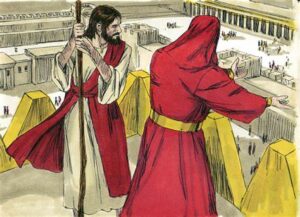Applying the Sword of the Spirit to Life
Applying the Sword of the Spirit to Life
In the last post I introduced some of the basic truths about the Sword of the Spirit, the last piece of armor listed by the  Apostle Paul in Ephesians 6. Applying the sword of the Spirit to life is the theme of this post. Here is a summary:
Apostle Paul in Ephesians 6. Applying the sword of the Spirit to life is the theme of this post. Here is a summary:
- The Sword of the Spirit is for offense against the enemy, particularly in a personal encounter with him.
- The word that Paul uses for sword is rhema in the Greek. This means that the word that is said in the time of battle is an application of God’s revelation to a particular situation.
- The best example of this is the temptation of Jesus.
The Example of Jesus in Applying the Sword
Jesus faced three temptations during his time in the wilderness.
The First Temptation
 The first attempt of the devil is to turn the stones into bread. Jesus is hungry after 40 days of fasting. The temptation, then, is to take action rather than trusting God to supply the necessary food. So Jesus begins applying the sword of the Spirit to this particular situation. What is his response, as recorded in Matthew 4:
The first attempt of the devil is to turn the stones into bread. Jesus is hungry after 40 days of fasting. The temptation, then, is to take action rather than trusting God to supply the necessary food. So Jesus begins applying the sword of the Spirit to this particular situation. What is his response, as recorded in Matthew 4:
4 Jesus answered, “It is written: ‘Man shall not live on bread alone, but on every word that comes from the mouth of God.’
There are several things to notice in this response:
- First of all, it is a quote from Deuteronomy 8:3. The context here is that Moses is preaching his final sermons before leaving the people of Israel. In chapter 8 he is recalling for the people that they were tested in this wilderness. Here’s the full verse: “He humbled you, causing you to hunger and then feeding you with manna, which neither you nor your ancestors had known, to teach you that man does not live on bread alone but on every word that comes from the mouth of the Lord.” In other words, God tried to teach them to depend on Him, not on themselves by giving them Manna each day. They could only gather enough for each day, except for the day before the Sabbath. Then they could gather two days’ worth of food. So, the point is that God taught them dependence. Jesus is here saying to the enemy that He will not abandon his trust in God to manipulate the world.
- Secondly, note how Jesus parries the sword. He takes that Old Testament word and turns it into a rhema, a fit statement for the immediate moment. He was applying the Sword of the Spirit to Life in this encounter.
The Second Temptation
 The second temptation challenge from Satan was for Jesus to throw himself down from the pinnacle of the temple to prove that God would fulfill his promise to protect him. Here is Jesus’ response:
The second temptation challenge from Satan was for Jesus to throw himself down from the pinnacle of the temple to prove that God would fulfill his promise to protect him. Here is Jesus’ response:
7 Jesus answered him, “It is also written: ‘Do not put the Lord your God to the test.’
Please note that Jesus response is to quote the Old Testament scriptures once again. He specifically quotes Deuteronomy 6;16, which says,
16 Do not put the Lord your God to the test as you did at Massah.
The reference to Massah refers to an event explained in Exodus 17. There we read:
7 And he called the place Massah[a] and Meribah[b] because the Israelites quarreled and because they tested the Lord saying, “Is the Lord among us or not?”
In other words, the people were creating a test so that God could prove himself. The test sprang from doubt that God was really present with them.
Again, Jesus was applying the sword of the spirit to life as defined by the Enemy.
The Third Temptation
 The third temptation was a challenge to bow down and worship the Enemy. If Jesus would do that, the need for the cross would be set aside. What is Jesus’ response?
The third temptation was a challenge to bow down and worship the Enemy. If Jesus would do that, the need for the cross would be set aside. What is Jesus’ response?
10 Jesus said to him, “Away from me, Satan! For it is written: ‘Worship the Lord your God, and serve him only.’[
This is a loose quote from Deuteromy 6:14, where it says,
13 Fear the Lord your God, serve him only and take your oaths in his name.
Conclusion
Note again that Jesus takes the Logos, the revelation that God has given us, and applies it to the specific situation or temptation He is facing. This is applying the sword of the Spirit to life as we encounter it. In the next post we’ll look at a contemporary example of how this works.



